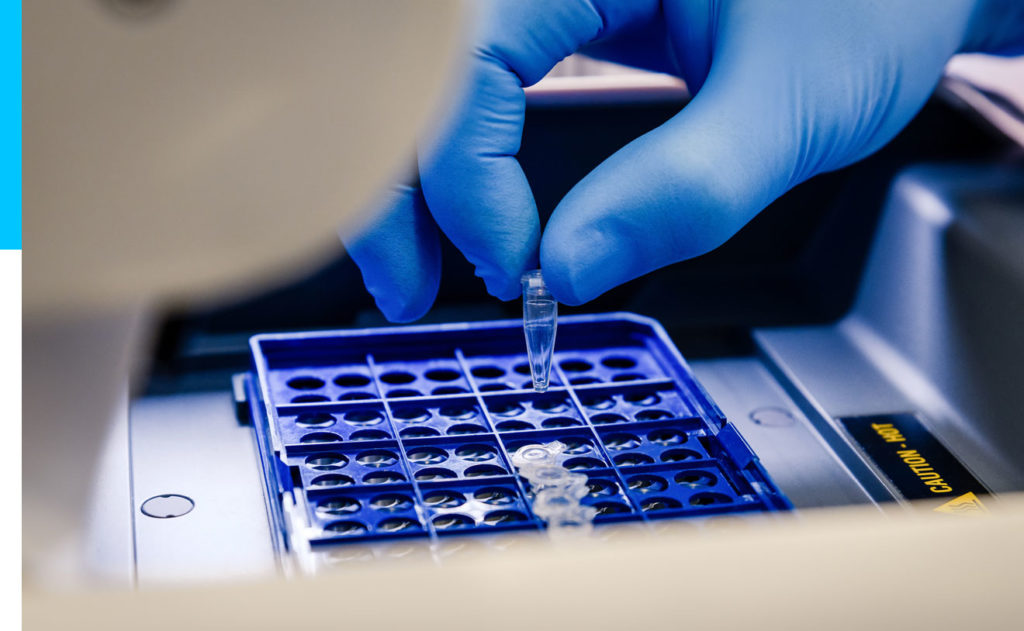WHAT IS PCR?
PCR, short for Polymerase Chain Reaction, is a lab technique that quickly identifies infection causing organisms. Small quantities of DNA or RNA in a sample are amplified, and detected using a targeted approach for finding the pathogens (fungal, bacterial, viral, or parasitic).
Ipsum Diagnostic’s PCR technique more accurately and rapidly identifies potential pathogenic organisms and possible resistant genes than conventional culture methods. We can now identify the infection with greater sensitivity and specificity and recommend the medication that is most effective decreasing cost and morbidity.

Ipsum’s pathogen assay uses the latest PCR technology to reliably analyze your patients sample.
- Detection of the most relevant bacterial, fungal and viral pathogens
- Patient specific antibiotic resistance
- Results are not affected by antibiotic exposure
- Highest level of sensitivity and specificity
- 99% accurate results in 48 hours or less from time of receipt
- Work with our physicians to improve patient outcomes
Our Dermatologic Panels
Post-Op/Acute Wound Panel
- Aeromonas hydrophila
- Acinetobacter baumannii
- Actinomyces israelii
- Bacteroides fragilis
- Campylobacter jejuni
- Candida auris, albicans
- Citrobacter freundii
- Clostridium botulinum
- Clostridium perfringens
- Corynebacterium striatum
- Eikenella corrodens
- Enterococcus faecalis, faecium
- Enterobacter spp.
- Escherichia coli
- Fusarium spp.
- Fusobacterium necrophorum
- Haemophilus influenzae
- Herpes Simplex Virus 1 and 2 (HSV1&2)
- Klebsiella spp.
- Listeria monocytogenes
- Methicillin-resistance Staphylococcus aureus (MRSA)
- Morganella morganii
- Mycobacterium marinum
- Pasteurella multocida
- Peptoniphilus spp.
- Peptostreptococcus spp.
- Prevotella spp.
- Propionibacterium acnes
- Proteus mirabilis
- Proteus vulgaris
- Pseudomonas aeruginosa
- Serratia marcescens
- Staphylococcus haemolyticus, lugdunensis
- Staphylococcus aueus
- Staphylococcus epidermidis
- Streptococcus agalactiae
- Streptococcus pneumoniae
- Streptococcus pyogenes
- Varicella zoster virus (VZV)
- Vibrio cholerae, parahaemolyticus, vulnificus
Extended Derm Panel
- Epidermophyton floccosum
- Microsporum canis and gypseum
- Trichophyton spp.
- Malassezia fufur, pachydermatis
- Candida auris, albicans, tropicalis, parapsalosis
- Alternaria spp.
- Aspergillus fumigatus, flavus
- Fusarium spp.
- Sporothrix schenckii
- Sarcoptes scabiei
- Corynebacterium minitissimum
- Klebsiella oxytoca
- Enterobacter spp.
- Propionibacterium acnes
- Proteus vulgaris
- Pseudomonas aeruginosa
- Methicillin-resistance Staphylococcus aureus (MRSA)
- Streptococcus agalactiae (Group B Strep)
- Streptococcus pyogenes (Group A Strep)
- Herpes Simplex Virus Type 1 and Type 2
- Varicilla-Zoster Virus
- Mycobacterium marinum abscessus, fortuitum, chelonae
Antibiotic Resistance Genes
Quinolone Resistance:
QnrA
QnrB
Vancomycin Resistance:
vanA1
vanBF
vanC1
Carbapenem Resistance:
VIM
KPC
IMP-2 group
OXA-48
Macrolide Resistance:
ErmA
ErmB
ErmC
Methicillin Resistance:
MecA
DERMATOLOGIC POLYMERASE CHAIN REACTION (PCR)
Why wait days for a bacterial panel and weeks for fungal culture results?
Ipsum Diagnostics can have your test results to you in less than 48 hours.
Real-time PCR utilizes highly specific assays for rapid, accurate profiling of polymicrobial infections. Let Ipsum provide your practice with quicker turn-around time for more effective treatment and superior patient care.
The advantages of PCR over traditional culture is unambiguous results that assist you with making all-important treatment decisions:
- Faster, more accurate and precise results
- Increased sensitivity and less prone to cross-contamination
- Rapid results help minimize morbidity and reduce costs
- DNA is extracted even on your most fragile specimens regardless of the viability of the swab
COMING SOON: Onychomycosis, Deep Fungal and Rate/Tropical Disease Panels
CONFIDENCE IN YOUR RESULTS
- Vetted and updated by our infectious disease and dermatology physicians with over 60 years of combined experience
- Based on clinically relevant targets, including common and emerging pathogens
- Consistent with Clinical Practice Guidelines and the Sanford Guide to Antimicrobial Therapy
Like our dermatology pathogen selection process, ABR gene selection and interpretation is provided by highly trained and experienced infectious disease and dermatology physicians to Ipsum’s clients.
Criteria for ABR gene selection:
- The gene confers resistance to antibiotics and is prevalent in pathogens commonly associated with skin infections seen in US-based dermatology practices
- The presence or absence of the gene impacts the clinician’s antibiotic choice and duration of therapy
Every decision counts when caring for your patients.
Disclaimer and Limitations
This test was developed and its performance characteristics were determined by Ipsum Diagnostics LLC. The test has not been cleared or approved by the U.S. Food & Drug Administration. This laboratory is certified under the Clinical Laboratory Improvement Amendments of 1998 (CLIA) as qualified to perform high complexity clinical laboratory testing.
The assay is designed to detect pathogenic and non-pathogenic organisms as well as antibiotic resistance genes found in soft-skin and tissue wounds. Qualitative real-time polymerase chain reaction is used to detect the presence or absence of organisms and antibiotic resistance genes. The panel only tests for the specific organisms and antibiotic resistance genes included in the panel. The panel is limited to those specific organisms and antibiotic resistance genes. The presence of any organism or antibiotic resistance gene not included in the panel cannot be excluded. Antibiotic resistance genes may be expressed by more than one organism, including organisms not included in the panel.
The information contained in this test report is intended to be interpreted by a licensed healthcare professional to determine its clinical significance. A positive result does not rule out infection or co-infection with other bacteria, fungi, or viruses not tested by the panel.
Therapeutics
The listing of medications is for informational purposes only and is not intended or recommended as a substitute for medical advice, diagnosis, or treatment. The listing of medications does not imply the presence or severity of infection, or the need for treatment. Predicted susceptibility is specific to the organism(s) and/or antibiotic resistance gene(s) detected. Medications are based on standards, studies, guidelines, and reference material and are not created or developed by Ipsum Diagnostics LLC or any of its affiliates. All treatment decisions are the sole responsibility of the ordering physician or other qualified healthcare professional within the clinical context. Referral to an Infectious Disease Specialist may be indicated and is at the sole discretion of the ordering healthcare provider.